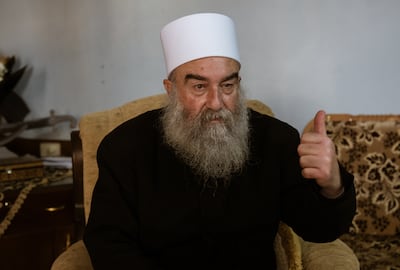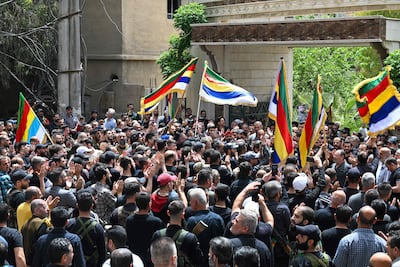The mayor of the mostly Druze town of Sahnaya in the suburbs of Damascus and his son were shot dead by unknown assailants, hours after forces from the Syrian ministries of defence and the interior entered the area, local media has reported.
Syrian authorities have opened an investigation into the killings, which happened after Hussam Wourour appeared in a video from the area discussing the escalating violence between the Druze community and the security forces, and calling for calm.
Syrian Druze spiritual leader Sheikh Hikmat Al Hijri on Thursday condemned a "genocidal campaign" against his people and called for "international forces to maintain peace and prevent the continuation of these crimes".
He spoke after three days of deadly sectarian clashes in Jaramana and Sahnaya, suburbs of the capital Damascus, as well as Suweida in south-west Syria, in which 101 people died, according to the Syrian Observatory for Human Rights war monitor.
In a statement, Mr Al Hijri said: "Seeking international protection is a legitimate right for people who have been wiped out by massacres.”
He asked the international community not to turn a blind eye to what is happening to the community. "We do not need words, but actions," he said.
"We are not advocates of secession, and we will not be," he said. "Rather, we advocate actual participation and the establishment of a democratic federal state that preserves our dignity, guarantees the freedom of the nation and the citizen, and maintains security.”
Sectarian violence broke out between Syrian security forces, fighters aligned with them, and local Druze fighters. The death toll from the violence included members of the security forces, fighters from the Druze minority and civilians. There were nine field executions and 92 deaths during clashes and ambushes.
In the southern Suweida province, 27 Druze gunmen were killed, 23 of them in an "ambush" on the Suweida-Damascus road on Wednesday, the UK-based monitor, which relies on a network of sources in Syria, said.
The fighters were killed in "an ambush carried out by forces affiliated with the ministries of interior and defence and gunmen allied with them," as a convoy of armed Druze men was heading from Suweida Governorate to the town of Sahnaya in the Damascus countryside, the Observatory reported.
The violence was sparked by an audio recording which circulated on social media, allegedly of a Druze citizen and deemed blasphemous. The Syrian authorities later said the recording was fake.
A truce agreement was reached on Wednesday in Jaramana and Sahnaya following meetings between Druze representatives and government officials. Syrian authorities announced the deployment of their forces in Sahnaya to ensure security, accusing "outlaw groups" of instigating the clashes.
However, Mr Al Hijri said: "We no longer trust an entity pretending to be a government ... because the government does not kill its people through its extremist militias ... and then claim they were unruly elements after the massacres. The government [should] protect its people."
A Druze fighter in Ashrafiyet Sahnaya told The National this week that the community is "living in fear".
"The state forces didn’t intervene," he said. "We’re isolated and left to defend ourselves. There have been dozens killed in the last days, it’s the worst in Damascus since the war.”
The sectarian violence has threatened to ignite broader unrest across Syria. It follows escalating tensions that began with a scuffle in Homs and then developed into a full-blown crisis for the HTS-led government of Ahmad Al Shara as he tries to restore order and project an image of unity and inclusion domestically and to the international community, following 14 gruelling years of civil war.
Israel on Wednesday carried out a strike in Syria against what it called "an extremist group" that attacked members of the Druze community, following through on a promise to defend the minority group. A Syrian Foreign Ministry statement rejected "all forms of foreign intervention" in Syria's internal affairs, without mentioning Israel, and declared Syria's commitment to protecting all Syrian groups "including the noble Druze sect".
It marks the first time Israel has announced a military strike in support of Syrian Druze since Bashar Al Assad was toppled, and reflects its deep mistrust of the new authorities.
The last sectarian killings took place in Syria's coastal area in March, where the Observatory said security forces and allied groups killed more than 1,700 civilians, mostly Alawites. It was the worst bloodshed since the removal in December of Mr Al Assad, who is an Alawite.
– With reporting from agencies
Explainer: Who are the Druze and why is this minority group in the headlines?
Company profile
Name: Back to Games and Boardgame Space
Started: Back to Games (2015); Boardgame Space (Mark Azzam became co-founder in 2017)
Founder: Back to Games (Mr Azzam); Boardgame Space (Mr Azzam and Feras Al Bastaki)
Based: Dubai and Abu Dhabi
Industry: Back to Games (retail); Boardgame Space (wholesale and distribution)
Funding: Back to Games: self-funded by Mr Azzam with Dh1.3 million; Mr Azzam invested Dh250,000 in Boardgame Space
Growth: Back to Games: from 300 products in 2015 to 7,000 in 2019; Boardgame Space: from 34 games in 2017 to 3,500 in 2019
UAE currency: the story behind the money in your pockets
THE BIO
Ms Davison came to Dubai from Kerala after her marriage in 1996 when she was 21-years-old
Since 2001, Ms Davison has worked at many affordable schools such as Our Own English High School in Sharjah, and The Apple International School and Amled School in Dubai
Favourite Book: The Alchemist
Favourite quote: Failing to prepare is preparing to fail
Favourite place to Travel to: Vienna
Favourite cuisine: Italian food
Favourite Movie : Scent of a Woman
Indoor Cricket World Cup Dubai 2017
Venue Insportz, Dubai; Admission Free
Day 1 fixtures (Saturday)
Men 1.45pm, Malaysia v Australia (Court 1); Singapore v India (Court 2); UAE v New Zealand (Court 3); South Africa v Sri Lanka (Court 4)
Women Noon, New Zealand v South Africa (Court 3); England v UAE (Court 4); 5.15pm, Australia v UAE (Court 3); England v New Zealand (Court 4)
Director: Shady Ali
Cast: Boumi Fouad , Mohamed Tharout and Hisham Ismael
Rating: 3/5
Islamophobia definition
A widely accepted definition was made by the All Party Parliamentary Group on British Muslims in 2019: “Islamophobia is rooted in racism and is a type of racism that targets expressions of Muslimness or perceived Muslimness.” It further defines it as “inciting hatred or violence against Muslims”.
The Pope's itinerary
Sunday, February 3, 2019 - Rome to Abu Dhabi
1pm: departure by plane from Rome / Fiumicino to Abu Dhabi
10pm: arrival at Abu Dhabi Presidential Airport
Monday, February 4
12pm: welcome ceremony at the main entrance of the Presidential Palace
12.20pm: visit Abu Dhabi Crown Prince at Presidential Palace
5pm: private meeting with Muslim Council of Elders at Sheikh Zayed Grand Mosque
6.10pm: Inter-religious in the Founder's Memorial
Tuesday, February 5 - Abu Dhabi to Rome
9.15am: private visit to undisclosed cathedral
10.30am: public mass at Zayed Sports City – with a homily by Pope Francis
12.40pm: farewell at Abu Dhabi Presidential Airport
1pm: departure by plane to Rome
5pm: arrival at the Rome / Ciampino International Airport
Pad Man
Dir: R Balki
Starring: Akshay Kumar, Sonam Kapoor, Radhika Apte
Three-and-a-half stars
THE%20HOLDOVERS
%3Cp%3E%3Cstrong%3EDirector%3A%20%3C%2Fstrong%3EAlexander%20Payne%3C%2Fp%3E%0A%3Cp%3E%3Cstrong%3EStarring%3A%3C%2Fstrong%3E%20Paul%20Giamatti%2C%20Da'Vine%20Joy%20Randolph%2C%20Dominic%20Sessa%3C%2Fp%3E%0A%3Cp%3E%3Cstrong%3ERating%3A%3C%2Fstrong%3E%204.5%2F5%3C%2Fp%3E%0A
'The Batman'
Stars:Robert Pattinson
Director:Matt Reeves
Rating: 5/5
Mohammed bin Zayed Majlis
ELECTION%20RESULTS
%3Cp%3EMacron%E2%80%99s%20Ensemble%20group%20won%20245%20seats.%26nbsp%3B%3C%2Fp%3E%0A%3Cp%3EThe%20second-largest%20group%20in%20parliament%20is%20Nupes%2C%20a%20leftist%20coalition%20led%20by%20Jean-Luc%20Melenchon%2C%20which%20gets%20131%20lawmakers.%26nbsp%3B%3C%2Fp%3E%0A%3Cp%3EThe%20far-right%20National%20Rally%20fared%20much%20better%20than%20expected%20with%2089%20seats.%3C%2Fp%3E%0A%3Cp%3EThe%20centre-right%20Republicans%20and%20their%20allies%20took%2061.%3C%2Fp%3E%0A
The five pillars of Islam
Water waste
In the UAE’s arid climate, small shrubs, bushes and flower beds usually require about six litres of water per square metre, daily. That increases to 12 litres per square metre a day for small trees, and 300 litres for palm trees.
Horticulturists suggest the best time for watering is before 8am or after 6pm, when water won't be dried up by the sun.
A global report published by the Water Resources Institute in August, ranked the UAE 10th out of 164 nations where water supplies are most stretched.
The Emirates is the world’s third largest per capita water consumer after the US and Canada.
Milestones on the road to union
1970
October 26: Bahrain withdraws from a proposal to create a federation of nine with the seven Trucial States and Qatar.
December: Ahmed Al Suwaidi visits New York to discuss potential UN membership.
1971
March 1: Alex Douglas Hume, Conservative foreign secretary confirms that Britain will leave the Gulf and “strongly supports” the creation of a Union of Arab Emirates.
July 12: Historic meeting at which Sheikh Zayed and Sheikh Rashid make a binding agreement to create what will become the UAE.
July 18: It is announced that the UAE will be formed from six emirates, with a proposed constitution signed. RAK is not yet part of the agreement.
August 6: The fifth anniversary of Sheikh Zayed becoming Ruler of Abu Dhabi, with official celebrations deferred until later in the year.
August 15: Bahrain becomes independent.
September 3: Qatar becomes independent.
November 23-25: Meeting with Sheikh Zayed and Sheikh Rashid and senior British officials to fix December 2 as date of creation of the UAE.
November 29: At 5.30pm Iranian forces seize the Greater and Lesser Tunbs by force.
November 30: Despite a power sharing agreement, Tehran takes full control of Abu Musa.
November 31: UK officials visit all six participating Emirates to formally end the Trucial States treaties
December 2: 11am, Dubai. New Supreme Council formally elects Sheikh Zayed as President. Treaty of Friendship signed with the UK. 11.30am. Flag raising ceremony at Union House and Al Manhal Palace in Abu Dhabi witnessed by Sheikh Khalifa, then Crown Prince of Abu Dhabi.
December 6: Arab League formally admits the UAE. The first British Ambassador presents his credentials to Sheikh Zayed.
December 9: UAE joins the United Nations.
Real estate tokenisation project
Dubai launched the pilot phase of its real estate tokenisation project last month.
The initiative focuses on converting real estate assets into digital tokens recorded on blockchain technology and helps in streamlining the process of buying, selling and investing, the Dubai Land Department said.
Dubai’s real estate tokenisation market is projected to reach Dh60 billion ($16.33 billion) by 2033, representing 7 per cent of the emirate’s total property transactions, according to the DLD.
Non-oil%20trade
%3Cp%3ENon-oil%20trade%20between%20the%20UAE%20and%20Japan%20grew%20by%2034%20per%20cent%20over%20the%20past%20two%20years%2C%20according%20to%20data%20from%20the%20Federal%20Competitiveness%20and%20Statistics%20Centre.%C2%A0%3C%2Fp%3E%0A%3Cp%3EIn%2010%20years%2C%20it%20has%20reached%20a%20total%20of%20Dh524.4%20billion.%C2%A0%3C%2Fp%3E%0A%3Cp%3ECars%20topped%20the%20list%20of%20the%20top%20five%20commodities%20re-exported%20to%20Japan%20in%202022%2C%20with%20a%20value%20of%20Dh1.3%20billion.%C2%A0%3C%2Fp%3E%0A%3Cp%3EJewellery%20and%20ornaments%20amounted%20to%20Dh150%20million%20while%20precious%20metal%20scraps%20amounted%20to%20Dh105%20million.%C2%A0%3C%2Fp%3E%0A%3Cp%3ERaw%20aluminium%20was%20ranked%20first%20among%20the%20top%20five%20commodities%20exported%20to%20Japan.%C2%A0%3C%2Fp%3E%0A%3Cp%3ETop%20of%20the%20list%20of%20commodities%20imported%20from%20Japan%20in%202022%20was%20cars%2C%20with%20a%20value%20of%20Dh20.08%20billion.%3C%2Fp%3E%0A
The%20specs
%3Cp%3E%3Cstrong%3EEngine%3A%20%3C%2Fstrong%3ESingle%20front-axle%20electric%20motor%3Cbr%3E%3Cstrong%3EPower%3A%20%3C%2Fstrong%3E218hp%3Cbr%3E%3Cstrong%3ETorque%3A%20%3C%2Fstrong%3E330Nm%3Cbr%3E%3Cstrong%3ETransmission%3A%20%3C%2Fstrong%3ESingle-speed%20automatic%3Cbr%3E%3Cstrong%3EMax%20touring%20range%3A%20%3C%2Fstrong%3E402km%20(claimed)%3Cbr%3E%3Cstrong%3EPrice%3A%20%3C%2Fstrong%3EFrom%20Dh215%2C000%20(estimate)%3Cbr%3E%3Cstrong%3EOn%20sale%3A%20%3C%2Fstrong%3ESeptember%3C%2Fp%3E%0A
Springsteen: Deliver Me from Nowhere
Director: Scott Cooper
Starring: Jeremy Allen White, Odessa Young, Jeremy Strong
Rating: 4/5
UAE currency: the story behind the money in your pockets
The specs
Engine: 3.0-litre six-cylinder turbo
Power: 398hp from 5,250rpm
Torque: 580Nm at 1,900-4,800rpm
Transmission: Eight-speed auto
Fuel economy, combined: 6.5L/100km
On sale: December
Price: From Dh330,000 (estimate)
THE LIGHT
Director: Tom Tykwer
Starring: Tala Al Deen, Nicolette Krebitz, Lars Eidinger
Rating: 3/5
Crops that could be introduced to the UAE
1: Quinoa
2. Bathua
3. Amaranth
4. Pearl and finger millet
5. Sorghum
Dhadak
Director: Shashank Khaitan
Starring: Janhvi Kapoor, Ishaan Khattar, Ashutosh Rana
Stars: 3
Living in...
This article is part of a guide on where to live in the UAE. Our reporters will profile some of the country’s most desirable districts, provide an estimate of rental prices and introduce you to some of the residents who call each area home.
The Al Barzakh Festival takes place on Wednesday and Thursday at 7.30pm in the Red Theatre, NYUAD, Saadiyat Island. Tickets cost Dh105 for adults from platinumlist.net
Election pledges on migration
CDU: "Now is the time to control the German borders and enforce strict border rejections"
SPD: "Border closures and blanket rejections at internal borders contradict the spirit of a common area of freedom"
COMPANY PROFILE
Name: Mamo Year it started: 2019 Founders: Imad Gharazeddine, Asim Janjua Based: Dubai, UAE Number of employees: 28 Sector: Financial services Investment: $9.5m Funding stage: Pre-Series A Investors: Global Ventures, GFC, 4DX Ventures, AlRajhi Partners, Olive Tree Capital, and prominent Silicon Valley investors. Specs
Engine: Duel electric motors
Power: 659hp
Torque: 1075Nm
On sale: Available for pre-order now
Price: On request
MO
%3Cp%3E%3Cstrong%3ECreators%3A%20%3C%2Fstrong%3EMohammed%20Amer%2C%20Ramy%20Youssef%3C%2Fp%3E%0A%3Cp%3E%3Cstrong%3EStars%3A%20%3C%2Fstrong%3EMohammed%20Amer%2C%20Teresa%20Ruiz%2C%20Omar%20Elba%3C%2Fp%3E%0A%3Cp%3E%3Cstrong%3ERating%3A%3C%2Fstrong%3E%204%2F5%3C%2Fp%3E%0A
AL%20BOOM
%3Cp%20style%3D%22text-align%3Ajustify%3B%22%3E%26nbsp%3B%26nbsp%3B%26nbsp%3BDirector%3AAssad%20Al%20Waslati%26nbsp%3B%3C%2Fp%3E%0A%3Cp%20style%3D%22text-align%3Ajustify%3B%22%3E%0DStarring%3A%20Omar%20Al%20Mulla%2C%20Badr%20Hakami%20and%20Rehab%20Al%20Attar%0D%3Cbr%3E%0D%3Cbr%3EStreaming%20on%3A%20ADtv%0D%3Cbr%3E%0D%3Cbr%3ERating%3A%203.5%2F5%0D%3Cbr%3E%0D%3Cbr%3E%3C%2Fp%3E%0A



